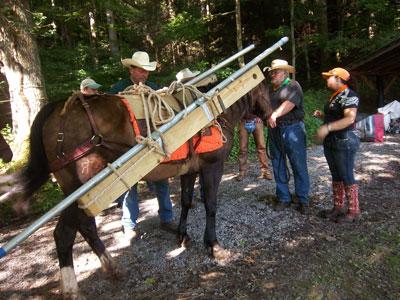The question of stock use in national parks has long sparked plenty of debate. A recently completed course at Great Smoky Mountains National Park aims to ease those concerns by teaching ways to reduce the impacts of stock use.
Many backcountry users are familiar with the Leave No Trace programs, which aims to "teach people of all ages how to enjoy the outdoors responsibly." The program is perhaps best-known to hikers, but efforts are underway to extend those same principles to stock use.
Friends of the Great Smoky Mountains and the Backcountry Horsemen of Big Creek recently sponsored a stock-oriented, Leave No Trace Master Educator course and Leave No Trace Backcountry Packing Clinic in Great Smoky Mountains National Park.
According to a spokesperson for the sessions, "Leave No Trace (LNT) is an outdoor ethics program that trains all users to minimize impacts in the backcountry. The stock-oriented LNT courses specifically provide training in common practices and proven methods to educe stock impacts."
The Master Educator course focuses on minimum impact general stock use in both backcountry and front country settings. The recent course held in the Smokies was a "train the trainer" session; students who completed the Master Educator course are certified as LNT Master Educators and can present programs, teach classes and certify others as stock-oriented LNT trainers.
Instructor Bob Hoverson has been a professional packer and stock manager for 42 years and has taught LNT for over 20 years. “Leave No Trace is about preserving our privilege to use stock on public lands by learning to minimize our impacts as much as possible,” says Hoverson. “All backcountry users should ask themselves, ‘Am I always doing everything I can to protect the land and respect other users?’”
In addition to teaching minimum impact techniques, the Backcountry Packing Clinic also teaches students how to pack mules and horses in the safest, most efficient manner possible. The course ended with an overnight pack trip, during which students have the opportunity to demonstrate newly acquired packing skills.
This is the first time the Packing Clinic has been taught east of the Mississippi. It is only the second time the stock-oriented Master Educator course has been taught east of the Mississippi and is a first in the Deep South region.
If you'd like more informational about stock-oriented Leave No Trace presentations, programs and courses you can call Christine Hoyer at 828-497-1949 or Melissa Cobern at 865-436-1264.




Comments
Great article, Jim Burnett. Thanks!